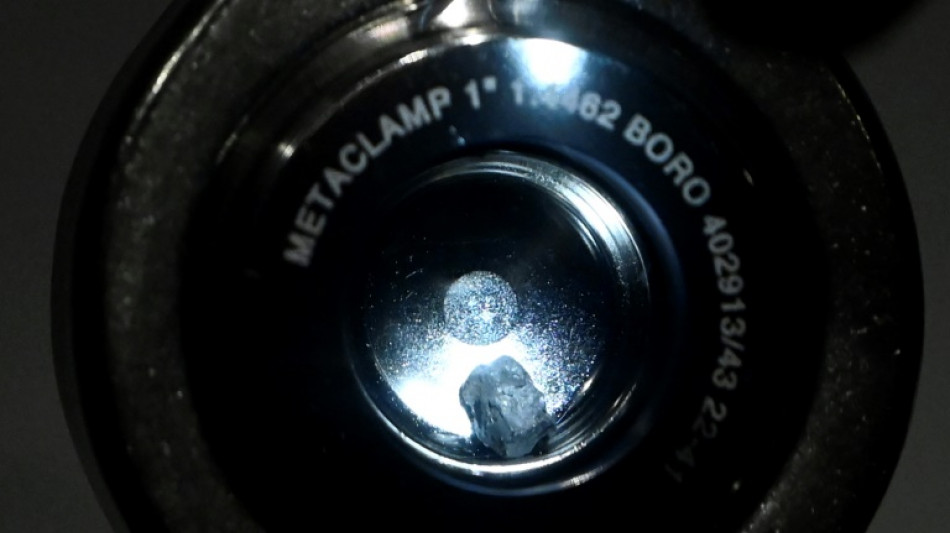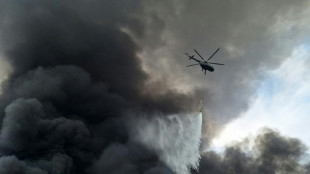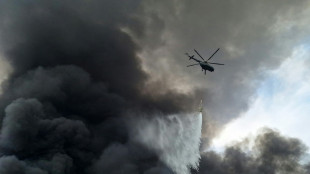
-
 Religious hate has no place in France, says Macron after Muslim killed in mosque
Religious hate has no place in France, says Macron after Muslim killed in mosque
-
Last day of Canada election campaign jolted by Vancouver attack

-
 Barcelona crush Chelsea to reach women's Champions League final
Barcelona crush Chelsea to reach women's Champions League final
-
Nine killed as driver plows into Filipino festival in Canada

-
 Germany marks liberation of Bergen-Belsen Nazi camp
Germany marks liberation of Bergen-Belsen Nazi camp
-
Hojlund strikes at the death to rescue Man Utd in Bournemouth draw

-
 Zelensky says Ukraine not kicked out of Russia's Kursk
Zelensky says Ukraine not kicked out of Russia's Kursk
-
Zverev, Sabalenka battle through in Madrid Open, Rublev defence over

-
 Ruthless Pogacar wins Liege-Bastogne-Liege for third time
Ruthless Pogacar wins Liege-Bastogne-Liege for third time
-
Bumrah claims 4-22 as Mumbai register five straight IPL wins

-
 No place for racism, hate in France, says Macron after Muslim killed in mosque
No place for racism, hate in France, says Macron after Muslim killed in mosque
-
Greenland leader says Trump's threats disrespectful

-
 Spain's Alex Marquez celebrates maiden MotoGP in home Grand Prix
Spain's Alex Marquez celebrates maiden MotoGP in home Grand Prix
-
Iran's president visits site of port blast that killed 28

-
 French rapper Jul breaks attendance record at national stadium
French rapper Jul breaks attendance record at national stadium
-
Gaza ministry says hundreds of war missing confirmed dead, toll at 52,243

-
 Crowds flock to Pope Francis tomb, as eyes turn to conclave
Crowds flock to Pope Francis tomb, as eyes turn to conclave
-
'Godfather' director Coppola bags lifetime achievement award

-
 Assefa sets world record, Sawe destroys high class field in London marathon
Assefa sets world record, Sawe destroys high class field in London marathon
-
'No excuse': Real Madrid's Rudiger after throwing object at ref

-
 Fire blazes day after Iran port blast killed 28, injured 1,000
Fire blazes day after Iran port blast killed 28, injured 1,000
-
Real Madrid meltdown after third Clasico defeat inevitable end to ugly weekend

-
 Nine killed as driver plows into Vancouver festival crowd
Nine killed as driver plows into Vancouver festival crowd
-
Crumbs! Should French bakeries open on May 1?

-
 All eyes turn to conclave as Pope Francis tomb opens to public
All eyes turn to conclave as Pope Francis tomb opens to public
-
Emotional Penge bounces back from betting ban for first DP Tour win

-
 25 killed, 1,000 injured in huge Iran port blast
25 killed, 1,000 injured in huge Iran port blast
-
Greenland PM visits Denmark as Trump threats loom

-
 Philippines, US test air defences as China seizes reef
Philippines, US test air defences as China seizes reef
-
25 killed, fires still burning in huge Iran port blast

-
 India and Pakistan troops exchange fire in Kashmir
India and Pakistan troops exchange fire in Kashmir
-
Eighteen killed, fires still burning in huge Iran port blast

-
 No handshake at muted India-Pakistan border ceremony
No handshake at muted India-Pakistan border ceremony
-
Maligned by Trump, White House reporters hold subdued annual gala

-
 Austria trials DNA testing to uncover honey fraud
Austria trials DNA testing to uncover honey fraud
-
Trump trade war pushes firms to consider stockpiling

-
 D'Backs' Suarez becomes 19th MLB player to hit four homers in one game
D'Backs' Suarez becomes 19th MLB player to hit four homers in one game
-
Continuity or rupture: what direction for the next pope?

-
 Surridge scores four as Nashville smash seven past Chicago
Surridge scores four as Nashville smash seven past Chicago
-
Chinese tea hub branches into coffee as tastes change

-
 Diplomacy likely to trump geography in choice of new pope
Diplomacy likely to trump geography in choice of new pope
-
All eyes turn to conclave after Pope Francis's funeral

-
 Doves, deaths and rations: Papal elections over time
Doves, deaths and rations: Papal elections over time
-
Progressive Canadians say social issues blown off election agenda

-
 Liverpool primed for Premier League title party
Liverpool primed for Premier League title party
-
Buenos Aires bids farewell to Francis with tears, calls to action

-
 Thunder sweep past Grizzlies in NBA playoffs, Cavs on brink
Thunder sweep past Grizzlies in NBA playoffs, Cavs on brink
-
Major blast at Iran port kills 14, injures 750

-
 'What we live for': Kounde after winning Barca Copa del Rey final
'What we live for': Kounde after winning Barca Copa del Rey final
-
More McIlroy magic at PGA pairs event but Novak and Griffin lead


Life's 'basic building blocks' found in asteroid samples
Pristine samples of the asteroid Bennu transported to Earth contain the "basic building blocks" for life, shedding new light on the perennial question of how life began on our planet.
The revelation, in two studies published Wednesday, is the result of work on just 120 grams of material -- about the weight of a banana -- collected from Bennu by NASA's OSIRIS-REx spacecraft in 2020.
The samples from Bennu, then around 300 million kilometres (186 million miles) from Earth, were returned in a capsule that OSIRIS-REx dropped off during a pass-by in 2023.
Initial analysis had already revealed evidence of high-carbon content and water.
But the new research found that evaporated water on Bennu's parent asteroid left behind "the raw ingredients of life", said Tim McCoy, curator of meteorites at the Smithsonian's National Museum of Natural History and co-lead author of one of the studies.
"We have discovered that next step on a pathway to life," he said in a press release issued by the museum.
Bennu appears to have formed around 65 million years ago from the debris of a parent asteroid dating back some 4.5 billion years.
The findings suggest Bennu's parent was once home to pockets of liquid water. When these evaporated, they left behind a "briny broth" of salts and minerals.
Some of the minerals include compounds that have never been seen in samples from outer space, the museum said.
And analysis of the samples strongly suggests a "non-terrestrial origin", adds one of the studies.
That could lend support to the theory that life on Earth was seeded from outer space.
- 'Unprecedented insight' -
The samples "give unprecedented insight into the processes that drove the formation of the Solar System," according to Yasuhito Sekine, a professor at the Institute of Science Tokyo.
"This discovery was only possible by analysing samples that were collected directly from the asteroid then carefully preserved back on Earth," he added.
"The salts would otherwise have rapidly absorbed moisture in the Earth's humid atmosphere."
The researchers believe similar salty brines may exist on other extraterrestrial bodies, including the dwarf planet Ceres and Saturn's moon Enceladus, as well as other asteroids.
They plan to reexamine specimens already on Earth for traces of compounds that previous research might have missed.
"Even though asteroid Bennu has no life, the question is could other icy bodies harbour life?" said Nick Timms, an associate professor at Curtin University's School of Earth and Planetary Sciences also involved in the research.
Much about life's origin remains unclear despite the secrets revealed from Bennu, McCoy cautioned.
"We now know we have the basic building blocks to move along this pathway towards life, but we don't know how far along that pathway this environment could allow things to progress," he said.
Still, Sara Russell, co-lead author with McCoy and a cosmic mineralogist at the museum, said the research had made "huge progress in understanding how asteroids like Bennu evolved, and how they may have helped make the Earth habitable".
F.Dubois--AMWN

